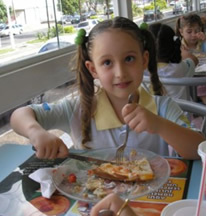Family life is the greatest opportunity for the child to learn an education based on moral principles and virtues.
When the family has good principles of education, using polite ways of dealing with each other in their daily lives, speaking in a calm, low tone of voice, using the words they translate politeness and politeness, such as saying good morning and good night, asking please, thank you with a thank you, asking permission, among many others, the child absorbs these concepts and takes them throughout the life.
However, what we see are families that miseducate, thinking that boys cannot learn good manners, as this will compromise their masculinity.
Who doesn't like a fine, well-educated man who opens the car door for his girlfriend or wife, who has the delicacy of presenting her with roses, pulling out her chair for her to sit in? The famous “gentleman”, so rare nowadays, that in his masculinity he manages to remain with concepts that do not compromise him in this sense, making him the most desired man. But for this to happen, it is necessary that the child has learned to live with these examples and concepts from an early age.
In some families it is normal to use profanity as a way of treating each other, parents call donkey children, pig, but it is good to remind them that only pig children it can be a pig, that the son of a donkey is also a donkey and that we are not animals to receive treatment as if we were, in a rude and pejorative.
Another thing that greatly compromises the child's education is when they do not receive adequate hygiene information, such as cleaning their nose in the bathroom, cleaning the same and washing their hands with soap and water, and not removing the secretions from all over the house or even on the street, in front of others people.
It is also common to see the family laughing, having fun when the child has flatus, releasing their gas anywhere, in front of anyone. Of course, a very young child takes some time to be able to control them, but around the age of two, when manages to control the sphincters, this domain can also be learned, if this is the example set by the family. In the case of burping, the baby should practice it, so there is no danger of choking with reflux, but gradually, as he grows, should also leave the habit.

A young child can properly cut their food
As for food, children are able to absorb the concepts of good etiquette from an early age and, even within their limitations linked to the development of motor coordination, they are able to show some learning in this regard, such as holding the spoon and taking alone the food to the mouth, they learn to cut the food correctly and, little by little, this becomes part of their routine, becoming good easy.
It's good to remember that what you learn in childhood stays with you for a lifetime and what you don't learn as a child becomes much harder to learn later. A common mistake parents make is allowing children to do whatever they want and, as they grow up, arriving by around seven/eight years old, they start a sudden charge, even hitting their children to correct them. If they had taught manners from a very young age this would not happen, they would not need to go to such an extreme.
So, educate your children by teaching them the basic rules of education, good manners and good coexistence, because life requires these concepts and those who do not have them face greater difficulties in the Social.
By Jussara de Barros
Graduated in Pedagogy
Brazil School Team
psychology - Brazil School

